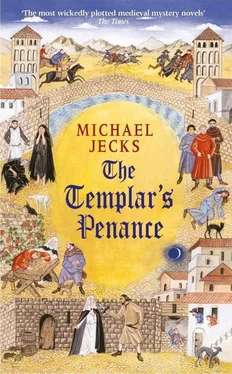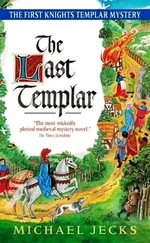Michael Jecks - The Templar
Здесь есть возможность читать онлайн «Michael Jecks - The Templar» весь текст электронной книги совершенно бесплатно (целиком полную версию без сокращений). В некоторых случаях можно слушать аудио, скачать через торрент в формате fb2 и присутствует краткое содержание. Год выпуска: 2014, ISBN: 2014, Издательство: Headline, Жанр: Исторический детектив, на английском языке. Описание произведения, (предисловие) а так же отзывы посетителей доступны на портале библиотеки ЛибКат.
- Название:The Templar
- Автор:
- Издательство:Headline
- Жанр:
- Год:2014
- ISBN:9781472219763
- Рейтинг книги:4 / 5. Голосов: 1
-
Избранное:Добавить в избранное
- Отзывы:
-
Ваша оценка:
- 80
- 1
- 2
- 3
- 4
- 5
The Templar: краткое содержание, описание и аннотация
Предлагаем к чтению аннотацию, описание, краткое содержание или предисловие (зависит от того, что написал сам автор книги «The Templar»). Если вы не нашли необходимую информацию о книге — напишите в комментариях, мы постараемся отыскать её.
The Templar — читать онлайн бесплатно полную книгу (весь текст) целиком
Ниже представлен текст книги, разбитый по страницам. Система сохранения места последней прочитанной страницы, позволяет с удобством читать онлайн бесплатно книгу «The Templar», без необходимости каждый раз заново искать на чём Вы остановились. Поставьте закладку, и сможете в любой момент перейти на страницу, на которой закончили чтение.
Интервал:
Закладка:
The pair initially hoped that they would find a new master very quickly. There were always petty wars going on up and down Europe, and Sir Charles started out confident that he would be able to find a post which would suit his skills very soon — but apart from a talk with a man who said he knew Roger Mortimer and had planned Mortimer’s release from the Tower of London, hinting that he would raise a host to defeat the King himself, there was no offer of a position. Even war appeared thin on the ground. Sir Charles reluctantly concluded that either the man was mad, or stupid. He would need more than a couple of disgruntled knights and their squires to be able to attack England and supplant the King. The fool was even boasting that he had the support of the French King and his daughter, Isabella, who was Queen of England — but Sir Charles couldn’t believe that. What would the Queen see in a fellow like Roger Mortimer?
Sir Charles and Paul soon left Paris. It was not a city in which they felt comfortable, and after hearing the recruiting story of Mortimer’s man, they agreed that they should seek employment elsewhere. If there were men trying to build an army, the King of England’s spies would not be far away, and rather than have Edward believe that he was the King’s determined and sincere enemy, which would probably lead to a short life and death in a darkened alley, Sir Charles chose to ride eastwards. He had heard that there was money to be earned in Lettow. The Order of Teutonic Knights was keen for new companions, and there were rumours of vast wealth to be won.
It was while he was on his way there that he met Dom Afonso.
Sir Charles had been bemoaning his shortage of funds. The last of his plate had been pawned in Paris for a pittance, to buy bread and cheap cheese, and he and Paul had nothing left. Neither was prepared to starve or suffer the pangs of thirst, and so, when they saw a deserted tavern by the side of a road, they entered and drank their fill. Dom Afonso was there too, a grim-faced man with staring eyes. Sir Charles saw him and wondered what sort of a man he might be, but then some French peasants entered and Sir Charles’s fate was sealed.
It was the rudeness of the peasants that upset him. He was unused to churls walking into a room disrespectfully and barging past. No English peasant in Lancaster would have dared do that. Astonishing behaviour. Quite extraordinary.
The first man to do it was a swarthy, barrel-chested fellow with a cast in one eye. He saw what sort of man he had pushed, but said nothing, merely carried on, waving to the tavern-keeper. After him came a pair of men, both carrying bills in their belts. Then a scruffy little urchin.
It was he who precipitated the fight. The young lad stumbled and fell with his full weight on Sir Charles’s foot.
‘You clumsy little bastard!’ he roared. His big toe felt almost as though it had been broken, and he jumped to his feet while the boy squeaked in alarm. As Sir Charles grunted angrily, the lad was grabbed from behind and pulled away, and suddenly the knight saw that before him were three men with their bills in their hands. Behind him, he knew, were more. He had no idea how many, but Paul could deal with most of them. He had faith in his squire’s ability.
‘ Anglais? ’ the swarthy man said sweetly, and than spat at Sir Charles’s foot.
That was all it took. His rage rushed over him, and in the time it took for his face to flush, he had drawn his sword. It flashed wickedly in the enclosed room, catching in a low beam, and then he was running at them, stabbing, slashing and hacking. So fierce was his attack that one man stumbled over a stool and died where he lay; a second tried to get close, and lost his head in the attempt, leaving only the swarthy man. He appeared to shrink in size before Sir Charles’s assault, suddenly realising his mistake in spitting, but the knight knew no pity. His sword swept up, slicing open the Frenchman’s belly so that coils of purple-blue fell from him. The man had time to glance down in horror, before the blade reversed and removed his head.
Behind him, he heard Paul’s blade ringing against another, and he spun around. Paul had two men before him still, but when he saw that his master was alive and well, he pressed his own case, and in a moment both were dead, one making a loud noise as his boots hammered on the floor in his death throes. It was irritating, so Sir Charles knocked a table over them, silencing their staccato rhythm.
Only then did he realise that the innkeeper himself was nowhere to be seen. The grim-visaged man still sat at his table, chewing on a hunk of bread, but there was no sign of anyone else. Sir Charles felt a curious sense of foolishness, standing with his sword drawn and ready, surrounded by slaughter, while a few feet away from him, unaffected by the mayhem, sat this odd-looking fellow. He cleaned his blade on the shirt of one of the peasants, and sheathed it. Only then did he see a pair of bare feet sticking out near the wine barrels. Peering closer, he saw that it was the tavern-keeper, and in his back was a wicked-looking long-bladed knife.
‘He was going to brain you,’ Afonso said courteously, pointing to a large club, and then walking around Sir Charles and retrieving his dagger from the man’s back. He wiped it clean on the man’s shirt, then threw it up. It whirled glittering in the light, and he caught it by the tip of the point, then up it went again, and this time he caught it by the hilt, swiftly stowing it away in his sheath. He stood there gazing down at the keeper’s body for a moment. ‘I wouldn’t have a knight attacked from behind. That is not honourable.’
Sir Charles commanded Paul to prepare their horses while he searched the place, hoping to find a stash of coins, but found only a few of low denomination. As he knew, all too often the trade in a place like this would depend upon a form of barter. There were some sausages drying in the chimney, and some bread on a table, and Sir Charles and Paul sat and ate, ignoring the stink and gore of death all around them, and both eyeing the stranger with slight suspicion.
‘My name is Afonso.’
Sir Charles introduced himself and his man, and then asked what Dom Afonso was doing in this place.
‘I thought to ride to find fame and fortune. Now I return home. I tried the joust, but,’ he shrugged emphatically, ‘I lost. So now I return to Portugal.’
Sir Charles nodded sympathetically. Those who lost a joust would often lose their armour and horses too, because a joust could develop into near-war; participants could get nasty and demand a ransom to release their prisoners.
‘The jousting can be difficult,’ he said.
‘Yes. But I had to leave my home to find a man.’
‘Ah. The gentleman has a name?’
‘He was called Matthew. I only knew him as Frey Matthew.’
‘Brother Matthew?’ Sir Charles repeated. ‘I have not met such a man.’
‘He was rumoured to be a great fighter with lance and spear, but,’ Afonso looked glum, ‘I failed to find him, and now I must return to my home. I have to find more money.’
‘We need money too,’ said Sir Charles. ‘You have far to ride?’
‘First I go to Galicia, to Compostela. There I shall pray to Saint James to let me find this man Matthew and kill him. He will understand why. I am avenging a terrible wrong. Brother Matthew is a traitor to his master, to his comrades, and to God.’
Sir Charles had never travelled so far before. To take leave for such a long period would have been troublesome to his master, but now he thought that the journey could be pleasing. The more he considered it, the more the idea had appealed to him. It would be good to join this man and visit the famous Cathedral of Santiago.
Читать дальшеИнтервал:
Закладка:
Похожие книги на «The Templar»
Представляем Вашему вниманию похожие книги на «The Templar» списком для выбора. Мы отобрали схожую по названию и смыслу литературу в надежде предоставить читателям больше вариантов отыскать новые, интересные, ещё непрочитанные произведения.
Обсуждение, отзывы о книге «The Templar» и просто собственные мнения читателей. Оставьте ваши комментарии, напишите, что Вы думаете о произведении, его смысле или главных героях. Укажите что конкретно понравилось, а что нет, и почему Вы так считаете.












